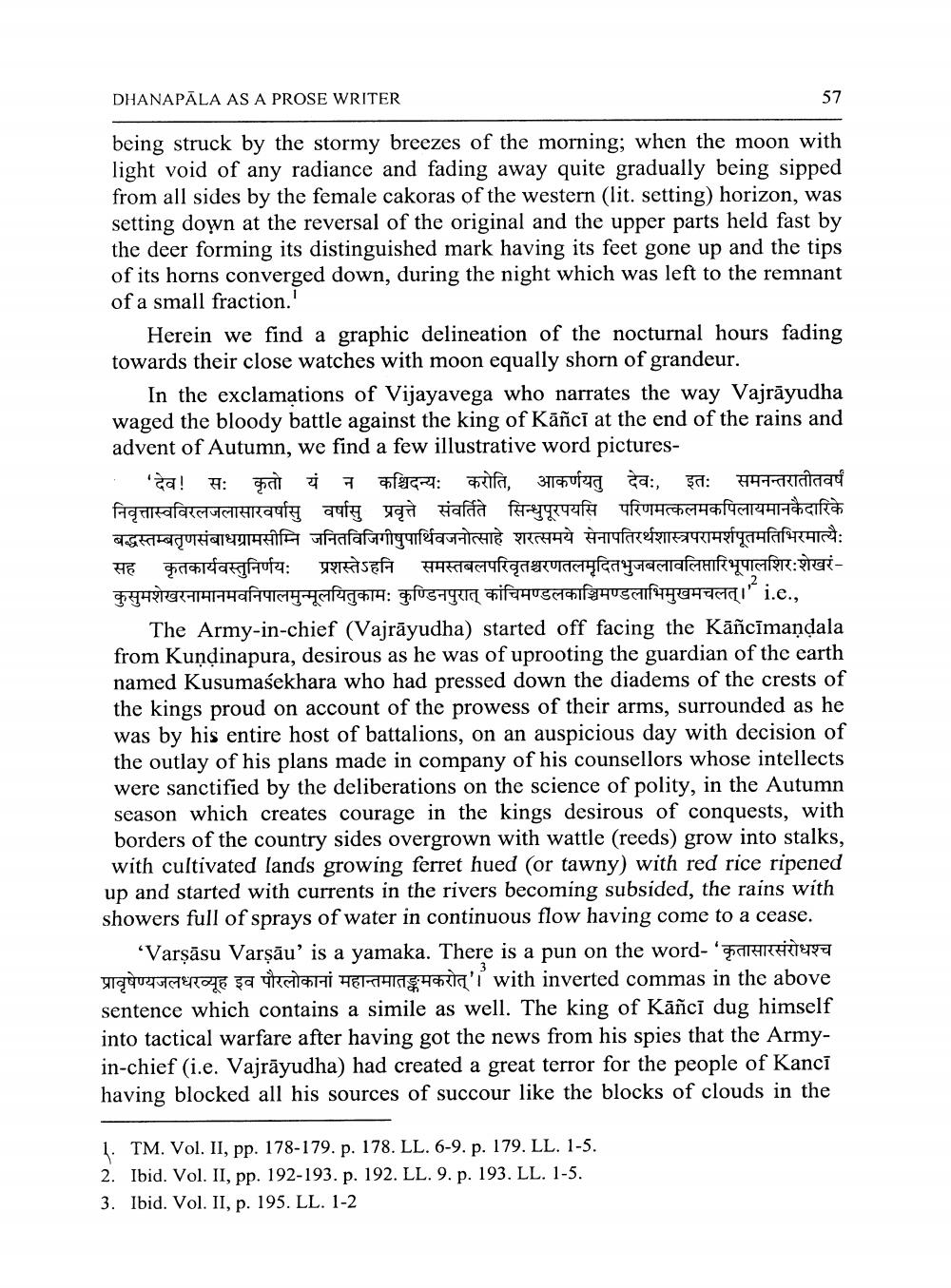________________
DHANAPALA AS A PROSE WRITER
being struck by the stormy breezes of the morning; when the moon with light void of any radiance and fading away quite gradually being sipped from all sides by the female cakoras of the western (lit. setting) horizon, was setting down at the reversal of the original and the upper parts held fast by the deer forming its distinguished mark having its feet gone up and the tips of its horns converged down, during the night which was left to the remnant of a small fraction.'
Herein we find a graphic delineation of the nocturnal hours fading towards their close watches with moon equally shorn of grandeur.
In the exclamations of Vijayavega who narrates the way Vajrāyudha waged the bloody battle against the king of Kāñci at the end of the rains and advent of Autumn, we find a few illustrative word pictures- 'देव! सः कृतो यं न कश्चिदन्यः करोति, आकर्णयतु देवः, इतः समनन्तरातीतवर्ष निवृत्तास्वविरलजलासारवर्षासु वर्षासु प्रवृत्ते संवर्तिते सिन्धुपूरपयसि परिणमत्कलमकपिलायमानकैदारिके बद्धस्तम्बतृणसंबाधग्रामसीम्नि जनितविजिगीषुपार्थिवजनोत्साहे शरत्समये सेनापतिरर्थशास्त्रपरामर्शपूतमतिभिरमात्यैः सह कृतकार्यवस्तुनिर्णयः प्रशस्तेऽहनि समस्तबलपरिवृतश्चरणतलमृदितभुजबलावलिप्तारिभूपालशिर:शेखरंकुसुमशेखरनामानमवनिपालमुन्मूलयितुकामः कुण्डिनपुरात् कांचिमण्डलकाञ्चिमण्डलाभिमुखमचलत्।' i.e.,
The Army-in-chief (Vajrāyudha) started off facing the Kāñcīmandala from Kundinapura, desirous as he was of uprooting the guardian of the earth named Kusumasekhara who had pressed down the diadems of the crests of the kings proud on account of the prowess of their arms, surrounded as he was by his entire host of battalions, on an auspicious day with decision of the outlay of his plans made in company of his counsellors whose intellects were sanctified by the deliberations on the science of polity, in the Autumn season which creates courage in the kings desirous of conquests, with borders of the country sides overgrown with wattle (reeds) grow into stalks, with cultivated lands growing ferret hued (or tawny) with red rice ripened up and started with currents in the rivers becoming subsided, the rains with showers full of sprays of water in continuous flow having come to a cease.
'Varşāsu Varşāu' is a yamaka. There is a pun on the word-AAR EITT प्रावृषेण्यजलधरव्यूह इव पौरलोकानां महान्तमातङ्कमकरोत्'| with inverted commas in the above sentence which contains a simile as well. The king of Kāñci dug himself into tactical warfare after having got the news from his spies that the Armyin-chief (i.e. Vajrāyudha) had created a great terror for the people of Kanci having blocked all his sources of succour like the blocks of clouds in the
1. TM. Vol. II, pp. 178-179. p. 178. LL. 6-9. p. 179. LL. 1-5. 2. Ibid. Vol. II, pp. 192-193. p. 192. LL. 9. p. 193. LL. 1-5. 3. Ibid. Vol. II, p. 195. LL. 1-2




